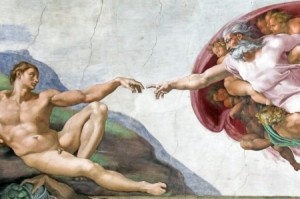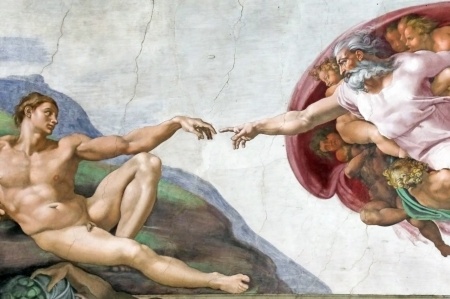
At the beginning of December in 2014, a BioLogos-funded study of the beliefs in human origins was publically released. Jonathan Hill, a sociology professor at Calvin College, conducted the study: The National Study of Religion and Human Origins (NSRHO). The survey had two primary purposes. The first was to “disaggregate” (separate into component parts) the typical survey questions used in the past to assess beliefs on human origins. The second purpose was to look at the influence of social context on these beliefs. The result may surprise you.
Gallup polls on evolution have been asking Americans which of three statements come closest to their beliefs on the origin and development of human beings for a number of years. Those positions and the percentages of Americans identified within the 2014 Gallup poll are as follows. First, human beings have developed over millions of years from less advanced forms of life, but God guided this process (31%). Second, human beings have developed over millions of years from less advanced forms of life, but God had no part in this process (19%). And third, God created human beings pretty much in their present form at one time within the last 10,000 years or so (42%).
As Jonathan Hill pointed out, if we categorize these results into “pro” and “anti” evolution camps, “it appears that nearly half the nation affirms evolution and nearly half denies it.” These statistics have then been used by a variety of sources for commentaries on evolution and creationism. But if such a large percentage of Americans continue to deny evolution, “then why do Americans score near the top on international comparisons of science literacy?”
He suggested that a better picture of beliefs about evolution was needed. So the NSRHO included separate questions on human evolution, God’s involvement, the way God created, the existence of a historical Adam and Eve, belief in literal 24-hour days of creation, and the geological timeframe for the emergence or creation of humans. Respondents could also say they were not sure about any particular question. And after each question they were asked to rate their level of certainty.
When a position affirming the main points of young earth creationism is assessed, namely that: a) that humans did not evolve from other species, b) that God was involved in the creation of humans, c) that God created directly and miraculously, d) that Adam and Eve were historical figures, e) that the days of creation were literal twenty-four hour day, and f) that humans came into existence within the last 10,000 years, only 8% of respondents agreed with all the main points of young earth creationism. Note how this contrasts with the Gallup “young earth” creationist category claiming 42% of Americans held that belief.
Taking a broad sense of theistic evolution, namely that respondents believed in human evolution and that God (or an intelligent force) was somehow involved in the creation of humans, only 16% of the population could be placed in that category. Additionally, only half of that group (8%) was very or absolutely certain of both of these beliefs. When a stricter definition is used, only 5% of the population claimed that a) humans evolved, b) God was involved, c) the days of creation were not literal, and d) humans emerged more than 10,000 years ago. If certainty on all these points was required, the percentage dropped to only 2% of the population. The Gallup poll category suggested 31% of Americans were “theistic evolutionists.”
Atheistic evolutionists, respondents who believed that humans evolved and God was not involved in the process, were around 9% of the population. Like theistic evolutionists, this group was about half the size of the comparable category from the Gallup poll. If a measure of certainty is included, only 6% of the population said they were very or absolutely certain that humans evolved and God was not involved in the process. The way that the NSRHO defined “atheistic evolutionist,” meant that someone could believe in God or an Intelligent force in the universe, but still hold to the two core beliefs of atheistic evolution.
By separating the beliefs in this way, much smaller proportions of the population were found to hold to the dominant positions on human origins. Many others were uncertain about what they believed or held uncommon beliefs (i.e., humans did not evolve from earlier species, and God had nothing to do with the emergence of humans).
Using the most generous definitions, the NSRHO finds that 37 percent of the population can be considered creationists, 16 percent can be considered theistic evolutionists, and nine percent can be considered atheistic evolutionists. This leaves 39 percent of the population as unsure or holding uncommon views . . . . If we adopt more restrictive definitions, these numbers begin to shrink further.
These results gave a more nuanced sense to the typical polls on American beliefs in evolution. In “The Recipe for Creationism,” a BioLogos article introducing the NSRHO study, Jonathan Hill described some of the factors that seemed be important for influencing a convinced creationist. These factors were: a) belonging to an evangelical Protestant denomination, b) believing that the Bible contained no errors, c) praying frequently and d) saying that faith was very or extremely important in day-to-day life. Some factors of social context were also important for convinced creationists. They were: a) belonging to a congregation that rejected human evolution and b) anticipating that changing beliefs about human origins could cause tension with religious leaders and other church members.
You can review the NSRHO for more information on the influence of social context on the various positions. But the most important takeaway, according to Hill, is that individual beliefs practices and identities are important, “but they only become a reliable pathway to creationism or atheistic evolutionism when paired with certain contexts or certain other social identities.” They are not mashed together from the free-floating ideas put together after considering all the alternatives. Rather, “they are found in certain social locations, and they become most plausible when shared with others (especially for creationists).”
I had an opportunity about twenty years ago to see a play put on by a local theater company in Dayton Tennessee, where the Scopes Monkey Trail was held. They performed it in the very same courtroom where the original trial was held. They also used several artifacts from the original trial as props for the play. The dialogue in the script for the play was overwhelmingly taken from the transcript from the trial. It was a special experience, feeling a bit like being able to be present at an important time in history.
It saddens me to see the perpetuation of fanaticism on both extremes of the evolution-creation debate. Particularly when Christians who are trying to honor their faith get caught up in spewing vitriol about positions that disagree with theirs. So I’d like to end this look at the BioLogos survey with a quotation of Clarence Darrow. Darrow was the defense attorney for Scopes at the trial.
Ignorance and fanaticism is ever busy and needs feeding. Always it is feeding and gloating for more. Today it is the public school teachers, tomorrow the private. The next day the preachers and the lectures, the magazines, the books, the newspapers. After a while, your honor, it is the setting of man against man and creed against creed until with flying banners and beating drums we are marching backward to the glorious ages of the sixteenth century when bigots lighted fagots to burn the men who dared to bring any intelligence and enlightenment and culture to the human mind. (Clarence Darrow, July 13, 1925)





